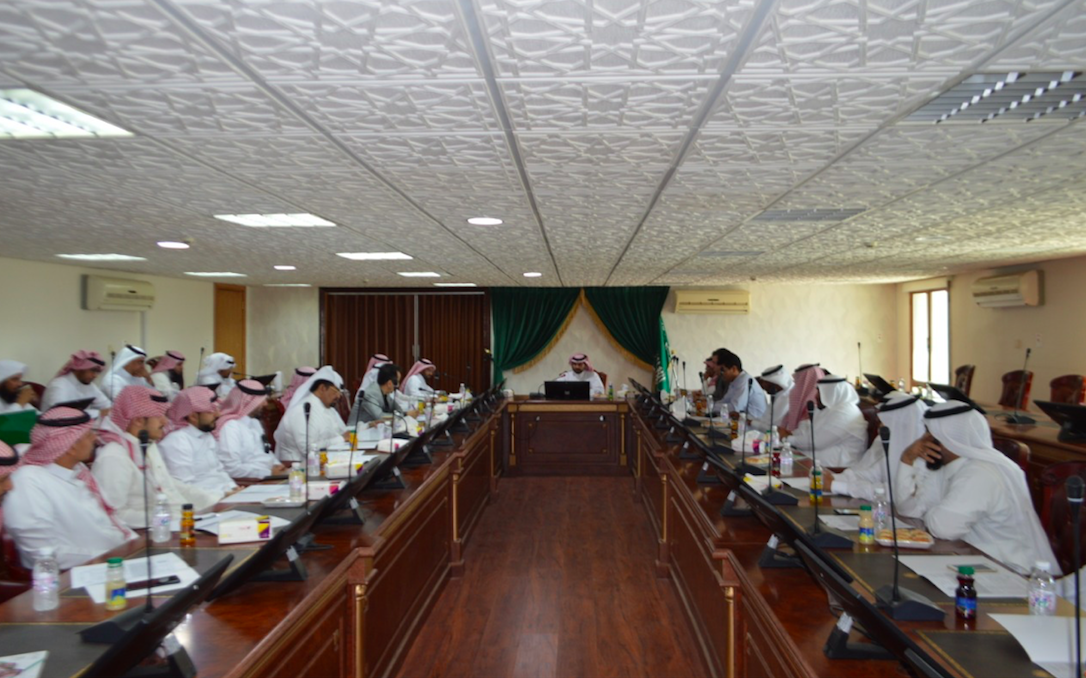
As part of the integration and partnership between the Directorate of Education and Al-Qunfudhah University College, Al-Qunfudah University College, represented by the departments of education, mathematics, chemistry, and physics, participated in a workshop entitled, "Improving Learning Outcomes in Light of Modern Global Trends in Science and Mathematics". The discussions were held on Wednesday, 22 Jumada Al-Thani, 1440 A.H., at the kind invitation of Al-Qunfudhah Directorate of Education.
The workshop discussed methods and strategies which can be adopted to improve students' performance in international tests, which is in line with Saudi Arabia's aspirations to improve educational outputs and increase international competition.
The Director of Al-Qunfudhah Education Department, Dr. Muhammad Al-Zahimi, launched the workshop. During the event, he referred to the importance of integration between Al-Qunfudhah University College and Al-Qunfudhah Education Directorate in developing and improving the quality of the educational environment.
After that, the Head of the Education Department at Al-Qunfudhah University College, Dr. Abdul-Majid bin Muhammad Al-Ghamdi, gave a speech in which he expressed his thanks to Dr. Muhammad Al-Zahimi, the working team, and the workshop organizers for their significant efforts in developing the students' performance in science and mathematics. Next, the work team, including the academic staff specializing in curricula and teaching methods for mathematics and science and specialists from the scientific departments, talked about the nature of mathematics and science, and tackled knowledge formation in the two specializations. They also talked about the most important strategies in teaching science and mathematics, and the importance of linking the content with the different levels of mathematical and scientific thinking, a point which international tests focus on. The workshop included the following themes:
First Theme: Teaching mathematics, which included the following topics:
First: The nature of mathematics, during which Dr. Yahya Al-Nashiri, assistant professor of Analytical Mathematics at the Department of Mathematics, talked about the nature of mathematical knowledge and the accompanying concepts, facts and mathematical laws, as well as the consequent abstraction and mathematical intuition.
Second: Mathematical concepts in TIMSS tests, which were presented by Dr. Hakim Ahmad Uthman, assistant professor of Pure Mathematics (topology) at the Mathematics Department, who talked about the content of the TIMSS tests, which are distributed in varying proportions between the different branches of mathematics: numerology, algebra, geometry, and the need to pay attention to this division when teaching mathematics. He also explained the different levels of mathematical thinking contained in TIMSS tests, which include: knowledge, application, reasoning, and justification.
Third: Teaching mathematical concepts and questions, during which Dr. Muhammad Ahmad Al-Mathami, assistant professor of Curricula and Teaching Methods of Mathematics at the Department of Education, talked about the necessity of linking mathematical concepts. He also pointed out the importance of implementing teaching strategies that are compatible with the nature and levels of mathematical thinking to achieve effective communication between the teacher and the learner.
Second Theme: Teaching science, which included the following topics:
First: The nature of science, during which Dr. Faraj Ibrahim Muhammad, assistant professor of Biology at the Department of Chemistry, talked about the nature of knowledge in the field of science, and the sources of its formation through observation and experimentation. He also talked about the branches of science contained in the TIMSS tests, and the importance of training students in the steps of scientific thinking.
Second: Science teaching strategies and its relation to TIMSS tests, which were presented by Dr. Muharram Yahya, associate professor of Curricula and Teaching Methods of Science at the Department of Education, who reviewed models of teaching strategies that are appropriate to the nature and levels of scientific thinking in TIMSS, based on understanding, application, and reasoning.
Third: The concepts of science in the TIMSS tests, during which Dr. Matar Ahmad Al-Eissa, assistant professor of Curricula and Teaching Methods of Science at the Department of Education, talked about the most important concepts related to science, and the different levels of scientific thinking contained in the TIMSS tests.
The workshop was attended by the Director of Quality and Performance and the coordinator of the training workshop, Mr. Hamza Al-Rufaidi, a number of educational leaders from Al-Qunfudhah Directorate of Education, educational supervisors, and the heads and teachers of the participating schools. At the end of the workshop, recommendations were discussed.